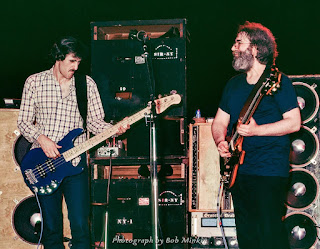An excerpt from A Tale of Twisted Fate
Following their first two shows at Madison Square Garden, Garcia and Weir paid a visit to NBC Studios to appear on Late Night with David Letterman. Middleweight Champion Sugar Ray Leonard, who had just come out of retirement to upset Marvelous Marvin Hagler, was the other guest. It made for a nice pairing—Sugar Ray and Jerry, the comeback icons. With his sharp wit and jovial demeanor, Garcia looked good, but if you compare this appearance to his last appearance on Letterman’s show in April 1982, he appeared to have aged twenty years in just five. Weir hadn’t aged a day since 1982.
Garcia and Weir joined Letterman’s band, led by keyboardist Paul Schaffer, and played “When I Paint My Masterpiece.” I’ve always been baffled as to why Weir sang lead vocals on “Masterpiece.” He did a respectable job with it, but the Garcia Band version was much better. After some relaxed and witty conversation with the host, Weir showed Letterman an old parlor trick. Weir, Letterman, Schaffer, and Biff Henderson gathered around Garcia and gave TV land the illusion that they were lifting Garcia out of his chair—a bit of silly magic. What happened the following night in Madison Square Garden was truly miraculous.
 The funky groove of “Shakedown Street”
ignited set two. There was group singing, clapping, and dancing as a euphoric vibe
gripped the crowd. It was a routine version, but NYC Deadheads embraced it as if
it were a stairway to a new enlightenment. “Man Smart, Woman Smarter” kept the dance
party flowing, and the audience was duly pumped for this popular but pedestrian
tune. Weir screamed a solo chorus in falsetto that led to a resounding finish. The
audience imposed its energy and will on the band and there was no turning back.
The funky groove of “Shakedown Street”
ignited set two. There was group singing, clapping, and dancing as a euphoric vibe
gripped the crowd. It was a routine version, but NYC Deadheads embraced it as if
it were a stairway to a new enlightenment. “Man Smart, Woman Smarter” kept the dance
party flowing, and the audience was duly pumped for this popular but pedestrian
tune. Weir screamed a solo chorus in falsetto that led to a resounding finish. The
audience imposed its energy and will on the band and there was no turning back.
An ordinary “Goin’ Down the Road Feelin’
Bad” set the stage for “All Along the Watchtower.” This was my first “Watchtower”
without Dylan, and there was a Garden roar as soon as the riff was identified. Garcia’s
first solo made everybody’s hair stand on end, and Weir shrieked, “No reason to
get excited!” It was at that point that I asked myself, What if they play ‘Morning
Dew’? I flashed back to that time I saw my first “Morning Dew” in Philadelphia,
and somehow, this moment would be bigger. After all Garcia had been through, and
where the Dead were now with the success of “Touch of Grey,” did Garcia have the
audacity to pull this off? The anticipation was unbearable. The thought of “Morning
Dew” emerging from “Watchtower” was almost too much to bear.
“Watchtower” fizzled into a few seconds
of no man’s land. If the next song were “Black Peter,” “Sella Blue,” or “Wharf Rat”—Garcia
songs that fell into that slot—it would have been a letdown, and it would have taken
me a few minutes to get into it. The moment demanded the Holy Grail. Garcia had
no path but the “Dew,” and he bent a warning note before striking into the sanctified
anthem. To be in the thick of that audience, and to experience the collective euphoria,
is the realization of the ultimate power of music, which is beyond anything from
any other realm. It was as if New York was healing Garcia, and Jerry just announced
that everyone had a winning lottery ticket.
Garcia delivered what we desired. He
sang soulfully and spiritually, bestowing it upon his devotees like a soothing prayer.
This is where the enthusiastic wisdom of New York Deadheads factored in. They knew
every nuance of the song and treated it like a religious anthem, only expressing
their joy in response to Jerry. You could hear a pin drop as Jerry growled, “Where
have all the people gawwwwn TODAY!” And then the silence was parted by the unified
approval of his followers. “Morning Dew” is an apocalyptical song of survival after
a nuclear war, but hearing Garcia sing it after coming back from a near-death experience
gave the anthem deeper resonance.
How was Garcia going to execute and extend this jam when he started with a climactic tirade? This is where the man excels, inventing pathways that never existed before. At one point he makes a circular motion with his hand as if he’s waving a magic wand, and then Garcia seemingly discovers a frequency that never existed before, the highest possible notes on the fretboard, and peels them off with speed and precision before the band joins him for the final fanning chord. The heroism is complete with a final: “I guess it doesn’t matter anyway.”








No comments:
Post a Comment